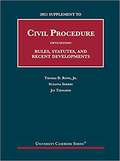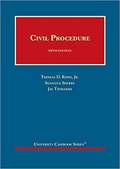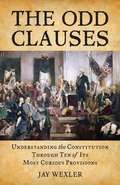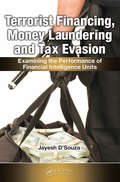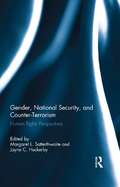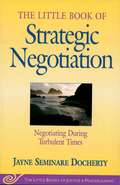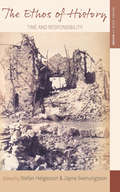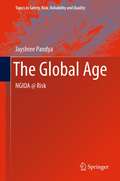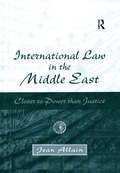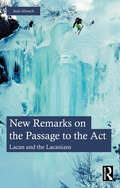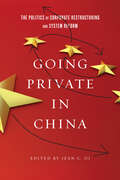- Table View
- List View
Sport: A Biological, Philosophical, and Cultural Perspective
by Jay SchulkinSports are as varied as the people who play them. We run, jump, and swim. We kick, hit, and shoot balls. We ride sleds in the snow and surf in the sea. From the Olympians of ancient Greece to today's professional athletes, from adult pickup soccer games to children's gymnastics classes, people at all levels of ability at all times and in all places have engaged in sport. What drives this phenomenon?In Sport, the neuroscientist Jay Schulkin argues that biology and culture do more than coexist when we play sports—they blend together seamlessly, propelling each other toward greater physical and intellectual achievement. To support this claim, Schulkin discusses history, literature, and art—and engages philosophical inquiry and recent behavioral research. He connects sport's basic neural requirements, including spatial and temporal awareness, inference, memory, agency, direction, competitive spirit, and endurance, to the demands of other human activities. He affirms sport's natural role as a creative evolutionary catalyst, turning the external play of sports inward and bringing insight to the diversion that defines our species. Sport, we learn, is a fundamental part of human life.
Forensic Science
by Jay SiegelIn the wake of the phenomenal success of such shows as CSI, forensic science has never been so popular. The obsessive attention to detail that Grissom and his crew afford seemingly insignificant details, such as particles of dirt in a bullet wound and the presence of pollen in tyre tracks, have had audiences eager to know more. Siegel's study follows the course of evidence all the way from the crime scene right through to the court judgement, investigating the many types of evidence, how they occur in crimes, how they are collected and analyzed by scientists, and how the results are presented in court. Packed with real examples, the book covers all the major areas of forensic science including drugs, trace evidence, pathology, entomology, odontology, anthropology, crime scene investigation, and law.
2021 Supplement To Civil Procedure, 5th, Rules, Statutes, And Recent Developments (University Casebook)
by Suzanna Sherry Thomas Rowe Jr. Jay TidmarshThe 2021 Statutory and Case Supplement brings the casebook up-to-date, noting new developments in a short introductory section. Because the supplement includes the Federal Rules of Civil Procedure and edited advisory committee notes, as well as the United States Constitution and relevant portions of the United States Code, the Federal Rules of Appellate Procedure, and the Rules of the Supreme Court of the United States, it can be used with any civil procedure casebook.
Civil Procedure (University Casebook)
by Suzanna Sherry Thomas Rowe Jr. Jay TidmarshCIVIL PROCEDURE FIFTH EDITION
All That We Share: How to Save the Economy, the Environment, the Internet, Democracy, Our Communities and Everything Else That Belongs to All of Us
by Jay WalljasperThe commons encompasses everything that is jointly owned by all of us, from gifts of nature, such as the airwaves and DNA, to products of human creativity and scientific knowledge, such as dance steps, religious traditions, and open-source software. In this introduction for general readers, Walljasper, a fellow at On the Commons (a commons movement strategy center) explains general concepts of the commons and why it matters, warning that much of the commons is under threat due to private interests. The book consists of short essays illustrated with b&w photos in a lively, reader-friendly layout. Many of the essays are credited to Walljasper and other writers from On the Commons, but others are excerpts from thinkers such as Jeremy Rifkin, Robert F. Kennedy Jr., and Winona LaDuke. Interspersed throughout the book are profiles of contemporary commons champions and boxes on real-life cases from around the country and around the world, such as an indigenous bill of rights, the Pacific Forest Trust, and the great Facebook rebellion. The book closes with advice for what ordinary people can do to restore the commons. Appendices offer a commons dictionary and a list of movies, novels, music, and art that evoke a spirit of sharing. Accessible to high school students and up, the book can be used as a supplemental text or for individual readers. Walljasper is former editor of Utne Reader. Annotation ©2011 Book News, Inc., Portland, OR (booknews.com)
Holy Hullabaloos: A Road Trip to the Battlegrounds of the Church/State Wars
by Jay WexlerIn Holy Hullabaloos, he takes us along for the ride, crossing the country to meet the people and visit the places responsible for landmark decisions in recent judicial history.
Our Non-Christian Nation: How Atheists, Satanists, Pagans, and Others Are Demanding Their Rightful Place in Public Life
by Jay WexlerLess and less Christian demographically, America is now home to an ever-larger number of people who say they identify with no religion at all. These non-Christians have increasingly been demanding their full participation in public life, bringing their arguments all the way to the Supreme Court. The law is on their side, but that doesn't mean that their attempts are not met with suspicion or outright hostility. In Our Non-Christian Nation, Jay Wexler travels the country to engage the non-Christians who have called on us to maintain our ideals of inclusivity and diversity. With his characteristic sympathy and humor, he introduces us to the Summum and their Seven Aphorisms, a Wiccan priestess who would deck her City Hall with a pagan holiday wreath, and other determined champions of free religious expression. As Wexler reminds us, anyone who cares about pluralism, equality, and fairness should support a public square filled with a variety of religious and nonreligious voices. The stakes are nothing short of long-term social peace.
The Odd Clauses
by Jay WexlerIf the United States Constitution were a zoo, and the First, Fourth, and Fourteenth amendments were a lion, a giraffe, and a panda bear, respectively, thenThe Odd Clauseswould be a special exhibit of shrews, wombats, and bat-eared foxes. Past the ever-popular monkey house and lion cages, Boston University law professor Jay Wexler leads us on a tour of the lesser-known clauses of the Constitution, the clauses that, like the yeti crab or platypus, rarely draw the big audiences but are worth a closer look. Just as ecologists remind us that even a weird little creature like a shrew can make all the difference between a healthy environment and an unhealthy one, understanding the odd clauses offers readers a healthier appreciation for our constitutional system. With Wexler as your expert guide through this jurisprudence jungle, you’ll see the Constitution like you’ve never seen it before. Including its twenty-seven amendments, the Constitution contains about eight thousand words, but the well-known parts make up only a tiny percentage of the entire document. The rest is a hodgepodge of provisions, clauses, and rules, including some historically anachronistic, some absurdly detailed, and some crucially important but too subtle or complex to get popular attention. This book is about constitutional provisions like Section 2 of the Twenty-first Amendment, the letters of marque and reprisal clause, and the titles of nobility clauses-those that promote key democratic functions in very specific, and therefore seemingly quite odd, ways. Each of the book’s ten chapters shines a much-deserved light on one of the Constitution’s odd clauses-its history, its stories, its controversies, its possible future. The Odd Clausesputs these intriguing beasts on display and allows them to exhibit their relevance to our lives, our government’s structure, and the integrity of our democracy.
Weed Rules: Blazing the Way to a Just and Joyful Marijuana Policy
by Jay WexlerWith full legalization seeming inevitable, it's time to shift the conversation—from whether recreational cannabis should be legalized to how. Weed Rules argues that it's time for states to abandon their "grudging tolerance" approach to legal weed and to embrace "careful exuberance." In this thorough and witty book, law professor Jay Wexler invites policy makers to responsibly embrace the enormous benefits of cannabis, including the joy and euphoria it brings to those who use it. The "grudging tolerance" approach has led to restrictions that are too strict in some cases—limiting how and where cannabis can be used, cultivated, marketed, and sold—and far too loose in others, allowing employers and police to discriminate against users. This book shows how focusing on joy and community can lead us to an equitable marijuana policy in which minority communities, most harmed by the war on drugs, play a leading role in the industry. Centering pleasure and fun as legitimate policy goals, Weed Rules puts forth specific policies to advocate for a more just, sensible, and joyous post-legalization society.
Nanotechnology for Environmental Management
by Mahendra Rai Jayanta Kumar Biswas"Nanotechnology for Environmental Management" is your gateway to the latest advancements in environmental science and technology. Edited by leading international scientists, this book delves into the diverse approaches and applications of nanomaterials and nanotechnologies, offering insights into their potential for environmental remediation, energy management, and sustainable development. Each chapter showcases cutting-edge innovations, making this book an essential reference for students, researchers, scientists, technicians, and professionals in environmental management and regulation.Explore the promises and challenges of nanotechnology in addressing environmental issues, and gain valuable perspectives on the future of sustainable development. With its thorough examination of state-of-the-art nanotechnological solutions, "Nanotechnology for Environmental Management" is your indispensable guide to navigating the complexities of environmental science and technology.
Toxic Chemicals: Risk Prevention Through Use Reduction
by Thomas E. Higgins Jayanti A. Sachdev Stephen A. EnglemanCatastrophic events such as the Bhopal, India tragedy and rising incidences of cancer in areas neighboring industrial facilities have heightened concern over the use of toxic chemicals in manufacturing and industry. Based on the authors' research conducted in Sao Paulo, Brazil, this book explores the history of toxic chemical release reporting programs, presents data on the toxicity of chemicals currently in use, discusses variables that contribute to the relative toxicity of a substance, compares existing programs for reducing environmental threats, and provides specific recommendations for reducing or eliminating the use of toxic chemicals.
Terrorist Financing, Money Laundering, and Tax Evasion: Examining the Performance of Financial Intelligence Units
by Jayesh D'SouzaTracking funding is a critical part of the fight against terrorism and as the threat has escalated, so has the development of financial intelligence units (FIUs) designed to investigate suspicious transactions. Terrorist Financing, Money Laundering, and Tax Evasion: Examining the Performance of Financial Intelligence Units provides a thorough analy
Taking Sides: Clashing Views In Human Sexuality (Taking Sides)
by Ryan W. McKee Tracie Q. Gilbert Jayleen GalarzaThe Taking Sides Collection on McGraw-Hill Create™ includes current controversial issues in a debate-style format designed to stimulate student interest and develop critical thinking skills. This Collection contains a multitude of current and classic issues to enhance and customize your course. <p><p> You can browse the entire Taking Sides Collection on Create or you can search by topic, author, or keywords. Each Taking Sides issue is thoughtfully framed with Learning Outcomes, an Issue Summary, an Introduction, and an "Exploring the Issue" section featuring Critical Thinking and Reflection, Is There Common Ground?, Additional Resources, and Internet References. Go to the Taking Sides Collection on McGraw-Hill Create™ at www.mcgrawhillcreate.com/takingsides and click on "Explore this Collection" to browse the entire Collection. Select individual Taking Sides issues to enhance your course, or access and select the entire McKee/Gilbert/Galarza: Taking Sides: Clashing Views in Human Sexuality, 14/e book.
The Hunted Heir: A Romantic Legal Drama
by Jayna BreighAfter a tragic loss, private investigator Nona Taylor swore off romantic entanglements and distanced herself from the world. Once a year, on New Year's Eve, she attends church to beg God for forgiveness, haunted by the guilt of driving her twin sister to her death. Attorney DeMarcus Johnson is determined to climb the ladder to partnership by winning high-profile cases at his Los Angeles law firm, harnessing his ADHD hyperfocus to excel. He's everything Nona knows to steer clear of--an overconfident ex-jock willing to do anything for success. Their worlds collide when Nona's pastor receives a mysterious letter claiming he's the sole heir to a substantial estate. Desperate for answers, Nona infiltrates a lavish charity ball, only to be found out by a suspicious stranger--so she latches onto DeMarcus and concocts a fib about being his fiancée. Now bound by a false engagement, the pair reluctantly join forces to discover the truth about the inheritance. But when an unseen enemy strikes, they realize the stakes are higher than they thought. Can Nona and DeMarcus overcome their differences to keep the pastor safe, secure DeMarcus's partnership, and preserve a future for themselves?
Gender, National Security, and Counter-Terrorism: Human rights perspectives (Routledge Research in Terrorism and the Law)
by Margaret L. Satterthwaite Jayne C. HuckerbyIn the name of fighting terrorism, countries have been invaded; wars have been waged; people have been detained, rendered and tortured; and campaigns for "hearts and minds" have been unleashed. Human rights analyses of the counter-terrorism measures implemented in the aftermath of 11 September 2001 have assumed that men suffer the most—both numerically and in terms of the nature of rights violations endured. This assumption has obscured the ways that women, men, and sexual minorities experience counter-terrorism. By integrating gender into a human rights analysis of counter-terrorism—and human rights into a gendered analysis of counter-terrorism—this volume aims to reverse this trend. Through this variegated human rights lens, the authors in this volume identify the spectrum and nature of rights violations arising in the context of gendered counter-terrorism and national security practices. Introduced with a foreword by Martin Scheinin, former UN Special Rapporteur on Human Rights and Counter-Terrorism, the volume examines a wide range of gendered impacts of counter-terrorism measures that have not been theorized in the leading texts on terrorism, counter-terrorism, national security, and human rights. Gender, National Security and Counter-Terrorism will be of particular interest to scholars and students in the disciplines of Law, Security Studies and Gender Studies.
Little Book of Strategic Negotiation: Negotiating During Turbulent Times
by Jayne DochertyMost books on negotiation assume that the negotiators are in a stable settintg. But what about those far thornier times when negotiation needs to happen while other fundamental factors are in uproarious change- deciding which parent will have custody of their child while a divorce is underway; bargaining between workers and management during the course of a merger and downsizing; or establishing a new government as a civil war winds down. From Docherty's experiences in environmental/public policy negotiations and community development work. A title in The Little Books of Justice and Peacebuilding Series.
The Ethos of History: Time and Responsibility (Making Sense of History #34)
by Jayne Svenungsson Stefan HelgessonAt a time when rapidly evolving technologies, political turmoil, and the tensions inherent in multiculturalism and globalization are reshaping historical consciousness, what is the proper role for historians and their work? By way of an answer, the contributors to this volume offer up an illuminating collective meditation on the idea of ethos and its relevance for historical practice. These intellectually adventurous essays demonstrate how ethos—a term evoking a society’s “fundamental character” as well as an ethical appeal to knowledge and commitment—can serve as a conceptual lodestar for history today, not only as a narrative, but as a form of consciousness and an ethical-political orientation.
The Global Age: NGIOA @ Risk
by Jayshree PandyaDr. Jayshree Pandya, founder of Risk Group LLC (http://www.riskgroupllc.com), is ahead of the curve in addressing the changing global fundamentals of the emerging Global Age. Global Age, and its changing global fundamentals has brought complex, chaotic, and turbulent times for every nation--where failures at all levels have come to become self-evident, repetitive, destructive, and potentially hopeless in nature and uncertainty. Nations are caught off guard. From what is visible across nations today, the promise of progress and prosperity for all nations does not seem to have materialized in a Global Age. Instead of progress and prosperity, what is visible today is crisis and catastrophe that is overpowering and overwhelming the capability of most nations to meet their promise of progress and prosperity. Nations are in crisis. This introductory book Global Age: NGIOA @ Risk addresses the global shifts and the changing global fundamentals of Global Age, to lay out much needed foundation of an integrated NGIOA risk governance framework for the coming tomorrow. This book will make a convincing case for the far-reaching need and understanding of global risk concepts, global risk fundamentals, and risk centric integrated NGIOA governance. The integrated NGIOA risk governance approach proposed and discussed in this initiative is rational, practical, and feasible. It will help create a dynamic, vibrant, and sustainable NGIOA economy of a Global Age. This initiative is a first step towards that.
50 Real Law School Personal Statements: And Everything You Need to Know to Write Yours
by Jdmission Senior ConsultantsProven strategies, practice, and review to ace the SAT Subject Test Biology E/M Getting into a top college has never been more difficult. Students need to distinguish themselves from the crowd, and scoring well on a SAT Subject Test gives students a competitive edge. Kaplan's SAT Subject Test: Biology E/M is the most up-to-date guide on the market with complete coverage of both the content review and strategies students need for success on test day.Kaplan's SAT Subject Test: Biology E/M features:* A full-length diagnostic test* 2 full-length practice tests* Focused chapter summaries, highlights, and quizzes* Detailed answer explanations* Proven score-raising strategies* End-of-chapter quizzesKaplan is serious about raising students' scores--we guarantee students will get a higher score.
International Law in the Middle East: Closer to Power than Justice
by Jean AllainExamining international law through the lens of the Middle East, this insightful study demonstrates the qualitatively different manner in which international law is applied in this region of the world. Law is intended to produce a just society, but as it is ultimately a social construct that has travelled through a political process, it cannot be divorced from its relationship to power. The study demonstrates that this understanding shapes the notion, strongly held in the Middle East, that law is little more than a tool of the powerful, used for coercion and oppression. The author considers a number of formative events to demonstrate how the Middle East has become an underclass of the international system wherein law is applied and interpreted selectively, used coercively and, in noticeable situations, simply disregarded. International Law in the Middle East brings various narratives of history to the fore to create a wider arena in which international law can be considered and critiqued.
New Remarks on the Passage to the Act: Lacan and the Lacanians
by Jean AllouchNew Remarks on the Passage to the Act considers what happens when psychoanalysis and the social sciences are called on to help modern societies overwhelmed by unexplained violence.Jean Allouch examines key events – the crimes of the Papin sisters, Lacan’s case of Aimée and the murder of Hélène Rytmann by Louis Althusser – and unpacks the concept of the "passage to the act". The book assesses these classic cases, resorting to contemporaneous studies and literature, particularly discussing Marguerite Duras’ novel L’Amante Anglaise. The book also considers modern acts of terrorism.New Remarks on the Passage to the Act will be of great interest to clinicians, academics and scholars of psychoanalysis, Lacanian studies, sociology, cultural studies and philosophy, and to Lacanian analysts in practice and in training.
Litigation in Otolaryngology: Minimizing Liability and Preventing Adverse Outcomes
by Peter F. Svider Jean Anderson Eloy Soly Baredes Shawn P. KellyThis text, edited by experienced academic and private otolaryngologists at different points in their careers, as well as an attorney, reviews the current literature related to otolaryngology malpractice litigation, and discusses strategies to decrease liability and enhance patient safety. It examines the most recent trial decisions in otolaryngology and determines which procedures are most commonly litigated in the current medicolegal environment. The text provides otolaryngologists with tips and pearls on how to prevent malpractice litigation, and discusses key actions to take when faced with malpractice litigation. Strategies for minimizing liability as well as the factors brought up in malpractice litigation related to otolaryngology – head and neck surgery are also discussed.Litigation In Otolaryngology will be a useful resource for all involved in the care of otolaryngologic patients (physicians, nurse practitioners, physician assistants, etc.), those concerned with the legal aspect of such care (including malpractice attorneys), and healthcare policy makers.
Just War Against Terror: The Burden of American Power in a Violent World
by Jean Bethke ElshtainAnalysis of the demands arising from the terror of 9-11.
Love Prevails: One Couple's Story of Faith and Survival in the Rwandan Genocide
by Jean Bosco RutagengwaTwenty-five years ago in April 1994, a savage campaign of genocide was unleashed against the Tutsis of Rwanda. In the space of one hundred days, one million people were left dead. This personal narrative tells the story of two survivors--Jean Bosco and his fiancée Christine. While most of their family members perished, they found refuge in what later become famous as the “Hotel Rwanda.” Their story of survival is at once a love story and a harrowing inside look at what happens when a country is overrun by evil. But it is also a story of faith--an effort to find God in the midst of horror--and of the subsequent struggle to find meaning, healing, and reconciliation.
Going Private in China: The Politics of Corporate Restructuring and System Reform
by Jean C. OiAs the Chinese Communist Party (CCP) set about reforming its centrally planned economy, it faced the thorny policy question of how to reform its state-owned enterprises (SOEs). Should it support a shift from public to private ownership of the means of production? Such a shift would challenge not only the CCP's socialist ideology but also its very legitimacy. Mixing the business of corporate restructuring with the politics of socialism presented nothing short of a policy nightmare. With policy-relevant acuity, the contributors to this wide-ranging volume address the questions about reform programs that have plagued China—and East Asia more broadly—since the 1990s. While China, Japan, and South Korea have all been criticized for implementing reform too slowly or too selectively, this volume delves into the broader contexts underlying certain institutional decisions. The book seeks to show that seemingly different political economies actually share surprising similarities, and problems. While Going Private in China sheds new light on China's corporate restructuring, it also offers new perspectives on how we think about the process of institutional change.


